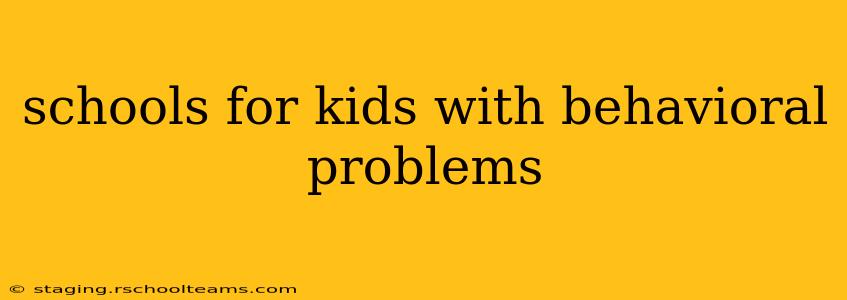Many parents face the challenge of finding appropriate educational settings for children with behavioral problems. It can be an overwhelming process, filled with uncertainty and worry. This guide aims to clarify the options and help you navigate the search for the best school for your child's unique needs. We'll explore different types of schools, considerations for choosing one, and frequently asked questions.
What Types of Schools Exist for Kids with Behavioral Problems?
Several types of schools cater to children exhibiting behavioral challenges, each with its own approach and intensity of support:
-
Public Schools with Specialized Programs: Many public school districts offer specialized programs within their regular schools to support students with behavioral issues. These programs might include smaller class sizes, specialized teachers trained in behavior management techniques, and individualized education plans (IEPs). These are often a good starting point, especially for children with less severe behavioral challenges.
-
Private Schools for Students with Behavioral Challenges: These schools offer a more intensive level of support than public school programs. They often have smaller student-to-teacher ratios, highly trained staff, and specialized therapeutic interventions. Some focus on specific behavioral issues like ADHD, while others cater to a broader range of challenges.
-
Residential Treatment Centers: These facilities offer 24-hour care and supervision for children with severe behavioral problems. They provide a structured environment with intense therapeutic interventions, academic instruction, and recreational activities. This option is typically considered for children whose needs cannot be met in a less restrictive setting.
-
Therapeutic Day Schools: These schools combine academic instruction with therapeutic services, providing a comprehensive approach to a child's needs. They offer a structured environment with individualized support and often work closely with families to develop strategies for managing behavior at home.
What Factors Should I Consider When Choosing a School?
Choosing the right school requires careful consideration of your child's specific needs and your family's circumstances. Here are some crucial factors:
-
Severity of Behavioral Challenges: The intensity of your child's behavioral problems will dictate the level of support required. A child with mild behavioral issues might thrive in a public school program, while a child with severe challenges might need a residential treatment center.
-
Academic Needs: Ensure the school provides appropriate academic instruction tailored to your child's learning style and abilities. Many schools for students with behavioral challenges offer individualized education programs (IEPs) to meet diverse academic needs.
-
Therapeutic Services: Consider the types of therapeutic interventions offered. This might include individual therapy, group therapy, behavior modification techniques, social skills training, or medication management.
-
School Environment: The school's environment should be supportive, safe, and structured. Consider the size of the school, the student-to-teacher ratio, and the overall atmosphere.
-
Location and Transportation: The school's location should be convenient for your family, considering transportation options and proximity to your home.
What is an Individualized Education Program (IEP)?
What is an IEP and how does it work?
An Individualized Education Program (IEP) is a legally binding document that outlines the specific educational goals and services for a student with a disability. It's created by a team that includes parents, teachers, school administrators, and specialists, and it details the student's strengths, weaknesses, and the supports they need to succeed academically and socially. The IEP is regularly reviewed and updated to ensure it continues to meet the child's needs.
How do I find schools for kids with behavioral problems near me?
How can I find appropriate schools in my area?
Finding appropriate schools requires proactive research. Start by contacting your local school district's special education department. They can provide information about available programs and services. You can also search online for private schools specializing in behavioral challenges, using keywords like "therapeutic schools," "behavioral schools," or "schools for students with emotional and behavioral disorders." Check directories of private schools and consult with educational consultants who specialize in placing students with behavioral needs in appropriate schools. Remember to thoroughly research each school, visit the facilities, and speak with administrators and teachers before making a decision.
What are the costs associated with these schools?
What are the typical costs involved?
Costs vary significantly depending on the type of school and the level of support provided. Public schools are typically free, while private schools and residential treatment centers can be very expensive. Tuition costs, therapy fees, and other associated expenses should be carefully considered. Many families explore funding options like insurance coverage, scholarships, and grants to offset the cost.
By carefully considering your child's needs, researching your options, and asking the right questions, you can find the best school to provide them with the support and education they deserve. Remember, finding the right fit requires patience and persistence. Don't hesitate to seek guidance from professionals, such as educational consultants or therapists, throughout the process.
